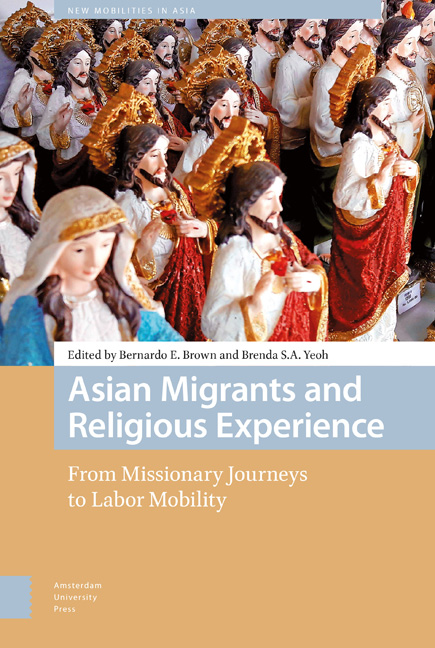Book contents
- Frontmatter
- Contents
- List of Illustrations
- Acknowledgments
- 1 Introduction: Human Mobility as Engine of Religious Change
- Section 1 Mobile Religious Practices
- 2 Saving Yogis: Spiritual Nationalism and the Proselytizing Missions of Global Yoga
- 3 Renewed Flows of Ritual Knowledge and Ritual Affect within Transnational Networks: A Case Study of Three Ritual Events of the Xinghua (Henghua) Communities in Singapore
- 4 Liberalizing the Boundaries: Reconfiguration of Religious Beliefs and Practice amongst Sri Lankan Immigrants in Australia
- Section 2 Transnational Proselytizing
- 5 From Structural Separation to Religious Incorporation: A Case Study of a Transnational Buddhist Group in Shanghai, China
- 6 “10/40 Window”: Naga Missionaries as Spiritual Migrants and the Asian Experience
- 7 Religion, Masculinity, and Transnational Mobility: Migrant Catholic Men and the Politics of Evangelization
- 8 Helping the Wounded as Religious Experience: The Free Burma Rangers in Karen State, Myanmar
- Section 3 Refashioning Religiosity in the Diaspora
- 9 A Multicultural Church: Notes on Sri Lankan Transnational Workers and the Migrant Chaplaincy in Italy
- 10 “Bahala Na Ang Diyos”: The Paradox of Empowerment among Filipino Catholic Migrants in South Korea
- 11 Feeling Hindu: The Devotional Sivaist Esthetic Matrix and the Creation of a Diasporic Hinduism in North Sumatra
- 12 Afterword: What Makes Asian Migrants’ Religious Experience Asian?
- References
- Index
4 - Liberalizing the Boundaries: Reconfiguration of Religious Beliefs and Practice amongst Sri Lankan Immigrants in Australia
Published online by Cambridge University Press: 12 December 2020
- Frontmatter
- Contents
- List of Illustrations
- Acknowledgments
- 1 Introduction: Human Mobility as Engine of Religious Change
- Section 1 Mobile Religious Practices
- 2 Saving Yogis: Spiritual Nationalism and the Proselytizing Missions of Global Yoga
- 3 Renewed Flows of Ritual Knowledge and Ritual Affect within Transnational Networks: A Case Study of Three Ritual Events of the Xinghua (Henghua) Communities in Singapore
- 4 Liberalizing the Boundaries: Reconfiguration of Religious Beliefs and Practice amongst Sri Lankan Immigrants in Australia
- Section 2 Transnational Proselytizing
- 5 From Structural Separation to Religious Incorporation: A Case Study of a Transnational Buddhist Group in Shanghai, China
- 6 “10/40 Window”: Naga Missionaries as Spiritual Migrants and the Asian Experience
- 7 Religion, Masculinity, and Transnational Mobility: Migrant Catholic Men and the Politics of Evangelization
- 8 Helping the Wounded as Religious Experience: The Free Burma Rangers in Karen State, Myanmar
- Section 3 Refashioning Religiosity in the Diaspora
- 9 A Multicultural Church: Notes on Sri Lankan Transnational Workers and the Migrant Chaplaincy in Italy
- 10 “Bahala Na Ang Diyos”: The Paradox of Empowerment among Filipino Catholic Migrants in South Korea
- 11 Feeling Hindu: The Devotional Sivaist Esthetic Matrix and the Creation of a Diasporic Hinduism in North Sumatra
- 12 Afterword: What Makes Asian Migrants’ Religious Experience Asian?
- References
- Index
Summary
Abstract
The reconsideration of religion in the lives of migrants intersects with the notion of mobility, its shifting meaning of time and space, as well as changes of behavior in everyday life. In a peaceful social environment, radical reinterpretation of religious beliefs and practices is often reluctantly tolerated, but it is also sometimes subject to repercussions. Long-term migration and transnationalism both bring alternatives or changes in religious beliefs and practices. These new interpretations are possible in the context of the migrants’ dislocation from their usual environments. Boundaries of ritual practices and the meaning of inclusion and exclusion are renegotiated. Meanwhile, boundaries of participation are relaxed. The divisions between sacred and profane are also blurred and reinterpreted. This chapter examines the changes in religious behavior among Sri Lankan Buddhist migrants in Darwin, Australia, and examines the ways in which religious beliefs and practices are reconfigured.
Keywords: transnationalism, religion, ritual, existentialism, space, Australia, Sri Lanka
Introduction
The act of migration is an ephemeral experience. It confronts two lifeworlds: the world left behind and the new world ahead of the migrant. This represents a dramatic shift in their personal lives and such experiences have social, cultural, and psychological effects, including tensions derivedfrom the transient natures of the migratory process. Premigratory experience, migration, and various stages of settlement generate intersubjective dialogues, which enrich the understanding of social and cultural life for migrants. The confrontation of two distinctive lifeworld experiences places migrants in an ambivalent position that affects how they conduct their daily lives.
For a migrant living in-between two worlds, religion becomes one of the spaces that can bring organization into their lives. This occurs as a result of the place in which religious beliefs, symbols, and rituals articulate the culture that they left behind. Therefore, migrants are compelled at this juncture to reconsider their attachment to religious life. This negotiation of religion is intertwined with aspects of change, such as, the phase of the migratory and settlement process, the migrants’ work status, living arrangements, and so on. Literature across disparate geographies (Hagan 2002; Jackson 2013a, 2013b; Nieswand 2011) highlights the ways in which migrants reconsider and negotiate their new lives, circumstances, and their attachment to religion.
- Type
- Chapter
- Information
- Asian Migrants and Religious ExperienceFrom Missionary Journeys to Labor Mobility, pp. 101 - 126Publisher: Amsterdam University PressPrint publication year: 2018



